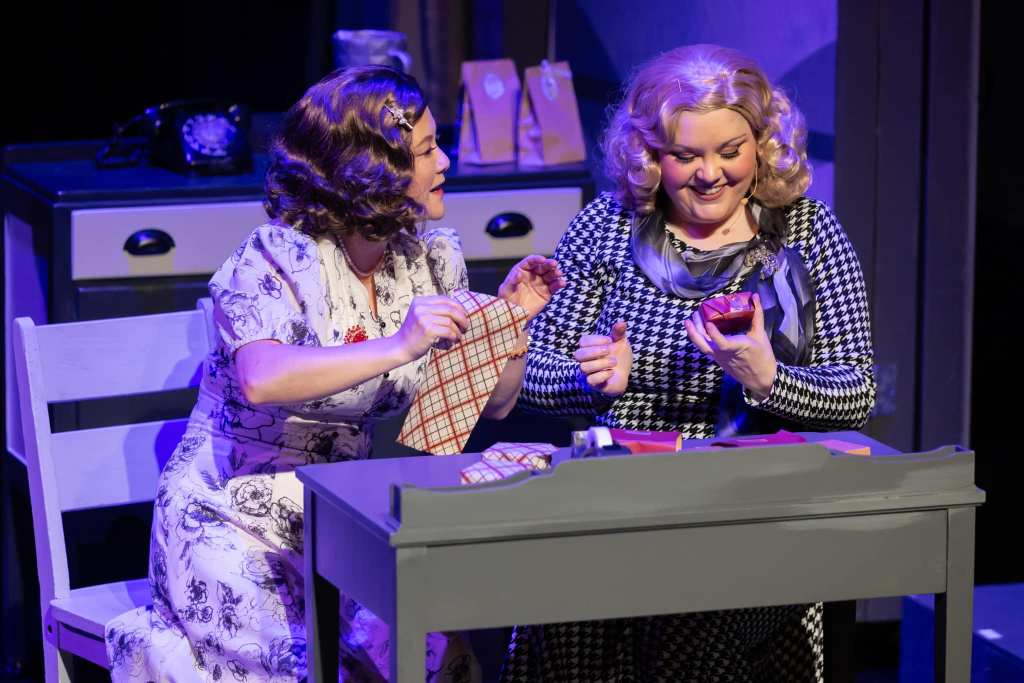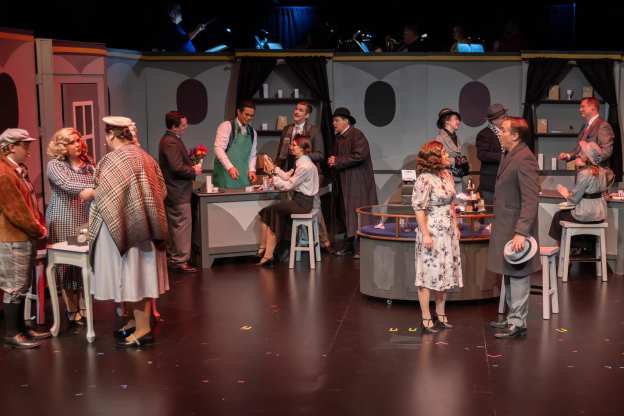A busy day in Maraczek’s Parfumerie, with Georg Nowack (Russ Farmer, downstage right) gatekeeping job applicant Amalia Balash (Ruth Wong-Miller, in cream figured dress) Photo Nanc Price Photography.
The pre-set for She Loves Me, at Théâtre Servus Credit Union (La Cité Francophone), is simple. A storefront with a bench in front of it, a backstage orchestra visible over the top. But as the stories unfold, the set (Leland Stelck) unfolds more literally, revealing the main set of a parfumerie in 1930s Budapest, and later shifting quickly to create a romantic cafe, a hospital room, and whatever else is needed. The counters, shelves, displays, and stock convey a store filled with luxuries and needs. It felt like it would be interesting to browse more closely – like going to Lush (without its overpowering mix of scents).
The show focuses on the parfumerie’s owner, Mr Maraczek (Brian Ault) and its employees (Andrew Kwan, Russ Farmer, Scott McLeod, Brendan Smith, and Christina O’Dell) along with job-applicant Amalia Balish (Ruth Wong-Miller). Like a Maeve Binchy novel, the script (Joe Masteroff) and clever direction (Melanie Lafleur) convey that all the characters have interesting stories that we want to hear more about. And not just the principal characters – the ensemble makes up a store full of recurring customers, a romantic cafe full of – romances – and other intriguing bits which I won’t tell you.
My two favourite ensemble bits of this show were “Twelve Days to Christmas” – putting a familiar retail spin on the Advent season – and the whole scene in the cafe. The cafe scene made good use of the depth of stage available to them, and with the raked auditorium seating of the Théâtre Servus, the audience could appreciate the performances upstage of the three women dining at the bar-counter and their server. Not having looked at the show program before the show started, I was surprised to see that this white-jacketed cafe server was Brendan Smith, whom I’d enjoyed on local stages since his appearance in Walterdale’s Light in the Piazza. I had been impressed by the enthusiasm and voice of the young shop delivery boy but with costuming and posture I hadn’t identified him as Smith! Other romantic couples are also enjoying drinks and dancing, and playing out their own narratives, while Amalia waits alone at a centre table for her mysterious pen-pal sweetheart. Aaron Schaan and Julia Stanski, spotted shopping together in earlier scenes, seem to have a proposal accepted. Real-life couple Trish van Doornum and Michael McDevitt are snuggling at a side table. Side flirtations are suggested in a fun dance number involving peeping from behind menu folders.
The premise of having couples meet through a newspaper Lonely Hearts Club correspondence column, getting to know each other through letters without revealing mundane life details, was updated to email for the 1998 movie You’ve Got Mail. Dating app experiences in 2023 encourage providing photos early on, so the plot-device of accidentally falling in love with a co-worker based on their text communication seems less timely, but the story is still easy to relate to.
I was pleasantly surprised at the range of sexual/romantic lives accepted among the main characters. Ilona, the woman who spends time at her lovers’ apartments (Christina O’Dell), is not vilified for it. Her co-workers as well as the audience are genuinely rooting for her to find a nice man who deserves her – or to have a nice evening at the library if that’s where she finds happiness now. Georg Nowack (Farmer) is single, so the boss assumes he must be spending his evenings at cabarets and nightclubs with a different woman every night, but no, he prefers quiet evenings at home.
I also appreciated that this story didn’t follow the trope of an independent woman being attracted to a cranky rude man despite herself, and then winning him over. Instead, Amalia is openly critical of Georg when he is being rude, only begins to appreciate him when he does something thoughtful (bringing her vanilla ice cream when she is sick), and then we see them gradually building trust and then affection over the days of a busy Christmas retail season.

The songs and instrumental music (Sheldon Harnick, Jerry Bock) enhance the experience throughout. Elizabeth Raycroft directs an orchestra of 11, and the performers all have good songs for their voices. I particularly enjoyed “Vanilla Ice Cream” and “Try Me” and the harmony in “I Don’t Know His Name”.

In 2015, Foote In The Door did She Loves Me as their first mainstage production ever. Since then, Broadway audiences have also had another chance to appreciate this musical, and there’s a cast recording of that 2016 Broadway production – I was delighted to discover that Christina O’Dell’s role of Ilona was played by Jane Krakowski of 30 Rock.
The company has been producing musicals ever since, at the Fringe as well as in their mainstage seasons. I attended opening night of that first production, so it was a treat to watch this one and recognize many familiar names of people who had been with the company from early days or who have joined Edmonton’s musical theatre community more recently. The deeper proscenium stage and more sharply raked seating at Théâtre Servus for this production supported different choices in directing and design to connect the audience intimately with the performers and allow interesting ensemble play. Costume choices for this production (Viola Park) were more subtle than in the 2015 show, with the parfumerie clerks mostly in well-fitting understated grey suits rather than plain green shopcoats, and glimpses of colour being added gradually, particularly in Amalia’s garments and accessories. As is current practice for many local companies now, some program information is displayed on a projection screen before the show starts, with the full program available via QR code. (I don’t have a good system for saving my online programs, the way I have boxes of hardcopy programs for everything from Fringe shows to Broadway.) And of course, in 2023 some of us attend the theatre wearing masks.
She Loves Me is playing Wed-Sat evenings and Sunday matinees until November 26th. Tickets are available here.





